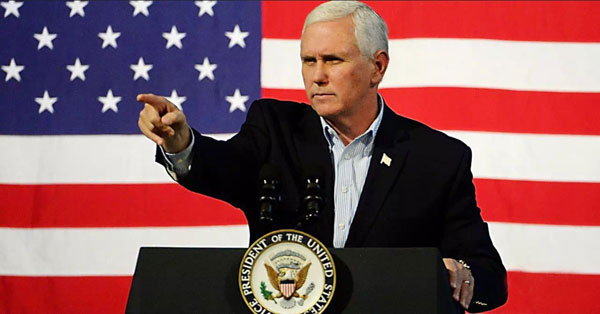


On Sept. 26, US President Donald Trump made a wild claim accusing China of meddling in US elections. “Regrettably we found that China has been attempting to interfere in our upcoming 2018 election coming up in November against my administration,” he said at meeting of the UN Security Council. He provided no evidence to back up his claim. It was an exercise in smoke and mirrors intended to demonize China.
The “proof” of Chinese meddling in US politics turned out to be an ad in a newspaper. Trump later took to social media to post photographs of the four-page advertising supplement in Iowa’s largest newspaper the Des Moines Register, describing the supplement as “propaganda,” even though the common practice of buying advertising space differs from malign influence operations.
In response to Trump’s accusations, State Councilor and Foreign Minister Wang Yi said that China has always followed the principle of non-interference in other countries’ domestic affairs. “This is a tradition of China’s diplomacy,” he said, adding that China “did not and will not” interfere in the domestic affairs of other countries.
Yet, despite a lack of evidence, the administration doubled down on its smear campaign against China. In his speech at a think tank in Washington, US Vice President Mike Pence accused China of “meddling in America’s democracy,” citing Trump’s speech at the United Nations. Chinese Ambassador Cui Tiankai later called the accusations “groundless” and reiterated the fundamental importance of non-interference in China’s foreign policy. “We have been consistent in this position,” he said.
There is no convincing evidence that China has orchestrated an effort to meddle in US politics; furthermore, it is well-documented that China has long been committed to the principle of non-interference in foreign affairs. It is more likely, therefore, that the administration wants to make a scapegoat of China to distract from its troubles and failures.
In fact, this “blame it all on China” strategy has been pointed out before. After Trump hurled accusations at China, Reuters reported that they “raised questions as to whether Trump was trying to deflect attention from an investigation of his campaign’s possible ties to alleged Russian meddling in the 2016 presidential election and also set up China for the blame if Republicans do poorly in the midterm vote.”
But whatever Trump administration’s intention might be, it is important to point out that China has stayed committed to the principle of non-interference in others countries’ domestic affairs. Besides, China has openly stated that it is not interested in meddling in US domestic affairs and elections.
It is time to lay the “China threat” lie to rest. There is considerable misunderstanding about China, especially in the West, and the administration is pushing a false narrative about China’s development to stir up fear. The “blame it all on China” strategy might result in short-term gain but a coordinated campaign to demonize China will likely lead to long-term pain. Of course, there are challenges and the two countries should discuss ways to address these challenges but stirring up anti-China hysteria ahead of the elections is a losing strategy.
 Fire brigade in Shanghai holds group wedding
Fire brigade in Shanghai holds group wedding Tourists enjoy ice sculptures in Datan Town, north China
Tourists enjoy ice sculptures in Datan Town, north China Sunset scenery of Dayan Pagoda in Xi'an
Sunset scenery of Dayan Pagoda in Xi'an Tourists have fun at scenic spot in Nanlong Town, NW China
Tourists have fun at scenic spot in Nanlong Town, NW China Harbin attracts tourists by making best use of ice in winter
Harbin attracts tourists by making best use of ice in winter In pics: FIS Alpine Ski Women's World Cup Slalom
In pics: FIS Alpine Ski Women's World Cup Slalom Black-necked cranes rest at reservoir in Lhunzhub County, Lhasa
Black-necked cranes rest at reservoir in Lhunzhub County, Lhasa China's FAST telescope will be available to foreign scientists in April
China's FAST telescope will be available to foreign scientists in April "She power" plays indispensable role in poverty alleviation
"She power" plays indispensable role in poverty alleviation Top 10 world news events of People's Daily in 2020
Top 10 world news events of People's Daily in 2020 Top 10 China news events of People's Daily in 2020
Top 10 China news events of People's Daily in 2020 Top 10 media buzzwords of 2020
Top 10 media buzzwords of 2020 Year-ender:10 major tourism stories of 2020
Year-ender:10 major tourism stories of 2020 No interference in Venezuelan issues
No interference in Venezuelan issues
 Biz prepares for trade spat
Biz prepares for trade spat
 Broadcasting Continent
Broadcasting Continent Australia wins Chinese CEOs as US loses
Australia wins Chinese CEOs as US loses